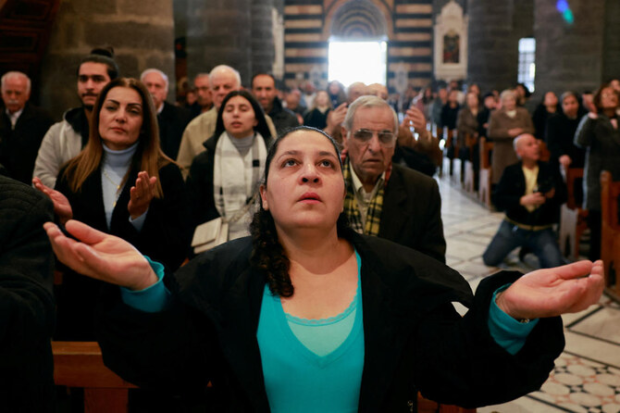
LATAKIA — Di bandar pelabuhan Latakia di barat laut Syria, penganut Kristian yang menghadiri Misa pada Ahad di Katedral Ortodoks Yunani St. George berharap kepimpinan Muslim yang sebahagian besarnya berfahaman Sunni di negara itu akan menghormati agama mereka.
Seperti penganut Kristian lain di seluruh negara, mereka menghadiri Misa pertama sejak militan menggulingkan Presiden Bashar Assad seminggu lalu.
Ahad lalu, pihak berkuasa Gereja memberi amaran kepada orang ramai supaya menjauhi (tempat) ibadah di tengah-tengah pergolakan ketika militan – diketuai oleh bekas cabang al Qaeda Hayat Tahrir Al-Sham (HTS) – menyerbu Damsyik dan menamatkan pemerintahan kejam oleh keluarga Assad selama 50 tahun.
Athanasios Fahed, Metropolitan Latakia dan tanggungannya untuk Gereja Ortodoks Yunani, mengetuai perkhidmatan Ahad di Latakia dan katedral yang dipenuhi orang ramai dalam cuaca pagi yang cerah.
“Ahad lalu, kami terkejut sama seperti semua rakyat Syria, tentang perubahan yang berlaku. Sudah tentu, kami mempunyai banyak ketakutan, terutama bagi mereka yang dipanggil minoriti,” kata Fahed kepada Reuters, walaupun dia menambah dia tidak menganggap minoriti Kristian kerana mereka “sebahagian daripada negara ini.”
“Tetapi sudah tentu, banyak persoalan yang timbul kerana jelas terdapat huru-hara di jalanan akibat kejatuhan negeri dan institusi keselamatan, ketenteraan, pegawai dan sivilnya,” kata Fahed.
Fahed berkata walaupun ramai penganut Kristian berpindah ke wilayah lain di bawah pemerintahan Assad, kawasan pantai seperti kawasan sekitar Latakia tidak terjejas.
Latakia adalah kubu kuat pemerintahan Assad.
Penduduk Syria termasuk komuniti minoriti etnik dan agama yang bersejarah termasuk Kristian, Armenia, Kurd dan Muslim Syiah, yang seperti ramai Muslim Syria yang lain telah bimbang semasa perang saudara 13 tahun bahawa mana-mana pemerintahan Islamis masa depan akan membahayakan cara hidup mereka.

Lina Akhras, setiausaha majlis paroki di gereja itu, berkata orang Kristian “selesa” di bawah Assad dari segi kebebasan kepercayaan mereka.
“Ia berlaku secara tiba-tiba, kami tidak tahu apa yang diharapkan. Jadi untuk melindungi semua orang, kami berhenti (beribadat) sehingga kami melihat bagaimana ia akan berkembang,” katanya kepada Reuters.
“Terima kasih kepada Tuhan, kami menerima banyak jaminan dan kami melihat bahawa ahli jawatankuasa (HTS) menghubungi paderi kami… diizinkan Tuhan, kami akan kembali ke kehidupan kami sebelum ini dan tinggal di Syria kami yang indah,” katanya kepada Reuters.
“Agama anda adalah milik anda, tetapi negara kita adalah untuk kita semua.”

AN-REUTERS
Hoping for religious harmony, Christians in a Syrian town attend Mass
LATAKIA — In Syria’s northwestern port town of Latakia, Christian worshippers attending Mass on Sunday at St. George Greek Orthodox Cathedral were hopeful that the country’s new largely Sunni Muslim leadership would respect their religion.
Like other Christians around the country, they were attending the first Mass since militants overthrew President Bashar Assad a week ago.
Last Sunday, Church authorities warned people to stay away from worship amid the upheaval as militants — led by former al Qeada offshoot Hayat Tahrir Al-Sham — swept into Damascus and ended 50 years of brutal rule by the Assad family.
Athanasios Fahed, the Metropolitan of Latakia and its dependencies for the Greek Orthodox Church, led Sunday’s service in Latakia and the cathedral filled with people in brisk morning weather.
“Last Sunday, we were surprised just like all Syrian people, of the change that happened. Of course, we had many fears, especially for those who are called minorities,” Fahed told Reuters, although he added he did not consider Christians minorities since they were “part of this country.”
“But of course, a lot of questions rose because obviously there was chaos in the street due to the fall of the state and its security, military, official and civil institutions,” Fahed said.
Fahed said that while many Christians were displaced to other regions under Assad’s rule, the coastal regions such as areas around Latakia were unaffected.
Latakia was a stronghold of Assad’s rule.
Syria’s population includes historic ethnic and religious minority communities including Christians, Armenians, Kurds and Shiite Muslims, who like many other Syrian Muslims had feared during the 13-year civil war that any future Islamist rule would imperil their way of life.
Lina Akhras, a parish council secretary at the church, said Christians had been “comfortable” under Assad in terms of their freedom of belief.
“It happened all of a sudden, we didn’t know what to expect. So in order to protect everybody, we stopped (worship) until we saw how it will develop,” she told Reuters.
“Thank God, we received a lot of assurances and we saw that members of the (HTS) committee reached out to our priest… God willing we will return to our previous lives and live in our beautiful Syria,” she told Reuters.
“Your religion is yours, but our country is for all of us.”
AN-REUTERS
